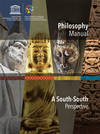World Philosophy Day 2016
Message from Irina Bokova, Director-General of UNESCO
This year, we celebrate World Philosophy Day immediately after International Day for Tolerance. This coincidence is deeply significant, given the link between tolerance and philosophy. Philosophy thrives on the understanding of, respect and consideration for the diversity of opinions, thoughts and cultures that enrich the way we live in the world. As with tolerance, philosophy is an art of living together, with due regard to rights and common values. It is the ability to see the world with a critical eye, aware of the viewpoints of others, strengthened by the freedom of thought, conscience and belief.
For all these reasons, philosophy is more than an academic subject; it is a daily practice that helps people to live in a better, more humane way. Philosophical questioning is learned and honed from the youngest age, as an essential key to inspiring public debate and defending humanism, which is suffering the violence and tensions in the world. Philosophy does not offer any ready-to-use solutions, but a perpetual quest to question the world and try to find a place in it. Along this road, tolerance is both a moral virtue and a practical tool for dialogue. It has nothing to do with the naive relativism that claims everything is equally valid; it is an individual imperative to listen, all the more striking because it is founded on a resolute commitment to defend the universal principles of dignity and freedom.
This year, UNESCO celebrates the birthdays of two eminent philosophers, Aristotle and Leibniz, who contributed to the development of metaphysics and science, logic and ethics. Both of them, a few centuries apart and in very different cultural contexts, placed philosophy at the core of public life, as the centrepiece of a free and dignified life. Let us, in turn, celebrate this spirit; let us dare to open spaces for free, open and tolerant thinking. On the basis of this dialogue, we can build stronger cooperation between citizens, societies and States, as a lasting foundation for peace.
Download the message in PDF format
English ǀ Français ǀ Español ǀ Русский ǀ العربية ǀ 中文
Media
Media advisory
Journalists wishing to cover the events require accreditation.
Contact
Laetitia Kaci - Tel.: +33 (0)1 45 68 17 72, l.kaci(at)unesco.org
Facebook: @unenuitdelaphilosophiealunesco
Twitter: #PhilosophyDay
Why celebrate philosophy?
By celebrating World Philosophy Day each year, on the third Thursday of November, UNESCO underlines the enduring value of philosophy for the development of human thought, for each culture and for each individual.
"Faced with the complexity of today’s world, philosophical reflection is above all a call to humility, to take a step back and engage in reasoned dialogue, to build together the solutions to challenges that are beyond our control. This is the best way to educate enlightened citizens, equipped to fight stupidity and prejudice. The greater the difficulties encountered the greater the need for philosophy to make sense of questions of peace and sustainable development."
Irina Bokova
UNESCO Director-General
A NIGHT OF PHILOSOPHY
UNESCO Headquarters, Paris
18-19 November 2016 - 7:00pm - 7:00 am
Come and celebrate Philosophy with us at UNESCO!
A Night of Philosophy is a nocturnal happening ˗ an encounter between philosophy, art and the general public. Free entrance
- More information ...
- Programme
- "Time and space" needed for philosophy to flourish
UN Radio interview with John Crowley, UNESCO
OTHER EVENTS
UNESCO PARIS
16-17 November 2016
17 November 2016
18 November 2016
UNESCO BUJUMBURA
17 November 2016
PUBLICATION
-
Philosophy manual: a South-South perspective
ISBN 978-92-3-101006-4
Join the celebration
-
Radio show. Contact popular local/national radio stations to request a slot to have a discussion with distinguished philosophers.
-
Organize a public meeting, debate or café philosophique on philosophical questions.
-
Initiate round table discussions among adults and young people to promote intergenerational understanding.
-
Organize a concert to promote World Philosophy Day. Invite your local musicians.
-
Get permission to use a public space for an arts exhibit or a book fair in relation to philosophy.
Related Information
Pages
Background
Key Documents
- A Selection of UNESCO publications on philosophy and related themes [PDF]
- Arab-Muslim Civilization in the Mirror of the Universal: Philosophical Perspectives
- Asian-Arab Philosophical Dialogues on Culture of Peace and Human Dignity [PDF, 2.7 MB]
- Asian-Arab Philosophical Dialogues on Globalization, Democracy and Human Rights [PDF, 1.9 MB]
- Asian-Arab Philosophical Dialogues on War and Peace [PDF, 1.1 MB]
- UNESCO Study “Philosophy: A School of Freedom” [PDF, 14 MB]
- Arab Spring as seen by Women Philosophers, Women Philosophers’ Journal, Issue N° 2-3, May 2013
- Squaring the circle, Women Philosophers’ Journal, Issue N° 1, November 2011
- Teaching Philosophy in Europe and North America [PDF, 1.8 MB]
- Teaching Philosophy in Latin America and the Caribbean [PDF, 699 KB]
- Teaching Philosophy in Africa: Anglophone Countries [PDF, 439 KB]
- Teaching Philosophy in Asia and the Pacific [PDF, 529 KB]
- Teaching Philosophy in the Arab Region [PDF, 940 KB]
- The UNESCO Courier - Humanism, a new idea [PDF, 5.6 MB]
- The UNESCO Courier - Philosophy, a cosmic responsibility [PDF, 906 KB]
See also
- World Humanities Conference
Liège, Belgium, 6-12 August 2017




